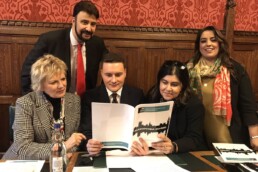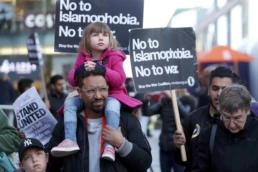There are some important things for us to consider:
1. Coronavirus is here and we have to face it for the considerable future, whether we like it or not. We must take the necessary precautions, but not become obsessed. We need to get on with ‘life’ under the new circumstances. As westerners, we’ve lived very comfortable lives, and most of our anxieties merely reflect losing some of those comfortabilities.
2. God is true, and so too is The Judgement. In fact, those are the only two certainties, so they require the greatest preparations. Nations have come and gone (plagues, famines, wars, natural disasters, and natural causes) – no one lives forever. Tomorrow we will all be history, specks in the annals of time. As we grow we create bonds (family, friends, partners) but as we continue through life and beyond, those bonds change (kids grow up and leave, spouses change, and we pass on to the akhirah on our own) – nothing is permanent. Believers get used to the idea of change and movement – the Prophets taught not to hold on to anything too dearly, except God Himself.
3. Accordingly, whilst the world is stuck in the grip of the ‘now’, believers deal with the present but with an eye on the future. When we eventually come out of this state, if the Almighty so wills, what kind of world do we want? How can we prepare for it now? Coronavirus will inevitably shift the social, political and economic landscape – what do we have to say and positively offer to that future?
4. Some Muslims, rather than living in their context, will simplistically talk of an Islamic polity. But even in speaking about one hypothetically, they overlook some basic logic. It is real people, their godliness, and their public and political culture that eventually make up the polity – it doesn’t just appear spontaneously. I tend to balk at the idea of an Islamic state because that requires Muslims, who don’t yet have a strong positive public and political culture, to make communal decisions and lead a successful nation (!) for which they clearly have little aptitude. Buzzwords like shari’ah or Quran and sunnah are quite meaningless in practice – they don’t just occur in some vacuum, they require humans to interpret them and enact them using their intellects. As al-Ghazali put it, “9/10ths of fiqh is purely premised on the intellect.” But given that many Muslims are yet to be cultivated in this way (and especially those who flippantly call for an Islamic state) what we’d end up with is anarchy, tyranny, and a failed state, all blasphemously in the name of God! The truth is that before any such talk – and that’s if such talk is even required – we need to cultivate ourselves with civility, revelation, critical intelligence, the spirit of the shari’ah, and norms and values that are beneficial to ALL of mankind. That’s what we’re supposed to do, wherever we are, whatever the political circumstances. The time for cultivation is now. And until we achieve these, which is what the shari’ah is actually for, sloganeering or dreams of grandeur are simply false propositions.
5. “But how can we prepare for a positive future for our own context whilst dealing with the current crises?!” Well, just as Prophets and their Companions did. Virtue and a lofty station with God is not achieved except through striving and sacrifice. The final Prophet and his Companions were socially and economically isolated from the rest of Makkan society for three years, but not only did the Prophet continue to educate and nurture the believers in ways that’d prepare them for phenomenal achievements later, the situation itself was part of their cultivation. In fact, it was held by the Prophet and his senior companions that comfortable living, and not hardship, was the most detrimental thing to the cultivation needed for prosperity, success and benefiting mankind. Whilst we might not be able to gather in order to learn and organise, we have technology that amazingly facilitates these things for us, from the comfort of our own homes.
6. So what do we need to cultivate for that future? Well firstly, we need to understand our relationship with God and what the Messengers were sent to teach us. What was the message about and what was its purpose? What’s the intelligent godly outlook on the important aspects of living? From there we need to practice what we learn and nurture the values of that message, individually and communally. Through practice and further education, we’ll become particularly skilful at working with one another, overcoming differences, nurturing a generally shared outlook, and engendering the norms of infusing God’s account of reality in everything we do, as well as the norms of problem-solving (rather than registering protest), intelligent deliberation, civilised engagement (no matter how controversial the issue), positive curiosity and openness, kindness, and fortitude. Much of this doesn’t happen because we have both emotional and intellectual baggage. And for many people this will inevitably mean positively re-connecting with their faith as if they had never known it.




